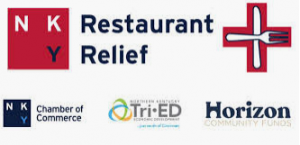Staff report
WYWQ* (While You Were Quarantined), work continued in many ways in the community and among major employers in the region. This was especially true for Tri-ED (the Tri-County Economic Development Corporation). Tri-ED did not close or reduce its work when the company team started working from home in mid-March. They committed to “keeping the office open” by continuing work and allowing the team to choose to work from home.
In May, the team worked on a restart plan, following state guidelines for offices, and divided the staff into two teams who began working in the office on Monday and Wednesday or Tuesday and Thursday. The alternating days, the team is worked remotely from home while everyone worked from home on Fridays.
Tri-ED’s focus since the pandemic began has been: how can the team help companies, communities and people in the region. This effort continues apace as the economy and companies re-open — and new companies want to move in.

During all the upheaval, Tri-ED and REDI Cincinnati earned a National Economic Development Award from Site Selection magazine for its work in attracting and helping clients expand their businesses in NKY and the Cincinnati region. And new President Lee Crume completed his transformation — re-organizing, re-shaping, and re-energizing — of the “company.” See the NKyTribune’s story here to understand the scope and reach of those efforts.
Progress definitely continued as Tri-ED’s Blue North became a separate organization focused on entrepreneurship services, thanks to a RISE grant from the Kentucky Cabinet for Economic Development. Brit Fitzpatrick will continue to lead the way. See the NKyTribune’s story here.
During quarantine
Tri-ED ramped up business retention outreach efforts early on in the pandemic to find out how it could serve its companies. They made over 1,000 contact points via email or phone calls with primary industry companies in Northern Kentucky – offering help and providing assistance as they dealt with requirements from the state, needs for PPE or new products due to a pivot in product manufacturing.
Tri-ED partnered with the NKY Chamber on webinars on the Paycheck Protection Program (PPP) and CARES Act, calls with the Congressional delegation staff and the NKY Restaurant Relief program. The team communicated daily and weekly with the Cabinet for Economic Development and REDI Cincinnati.

The Tri-ED team
Kimberly Rossetti, VP of Economic Development, led outreach to site selection consultants to hear what they are seeing and hearing from their clients.
Cheryl Besl, Director of Marketing, has been sharing the story of how Northern Kentucky companies pivoted to provide PPE and hand sanitizer for healthcare professionals and now companies in NKY as they worked to open for business. Camco Chemical, Tri State Plastics, AquiSense, Divisions Maintenance Group and Gravity Diagnostics are a few of the companies Tri-ED helped gain recognition for their efforts.
Tri-ED also held two information sessions for community members – to help them understand the CARES Act and loan programs for small businesses.
Support for businesses
Tri-ED decided early on in the pandemic to help businesses of all sizes. In addition to its core economic development work, Tri-ED joined the Northern Kentucky Chamber of Commerce and Horizon Community Funds of Northern Kentucky to launch the NKY Restaurant Relief Fund. The program began on April 8 and awarded $1,000 grants to 47 restaurants in the region. The fund was established to assist local restaurants and bars forced to temporarily cease in-person dining because of the COVID-19 (novel coronavirus) pandemic. Restaurants have used the funds in many ways, including buying take-out supplies in order to re-open, adding new menu offerings with the purchase of an ice cream machine, and replacing HVAC systems.

Tri-ED also worked with regional communities over the last 2 1/2 months to find unique ways to assist them. The Tri-ED team supported the Fort Mitchell Small Business Grant Application by reviewing the applications for a $2,500 grant as they were submitted online and reaching out to businesses about their documentation and answering questions. The 34 grants were announced on April 24 and dispersed less than a week after the program was announced.
Strong project activity
Tri-ED worked to reduce its budget and maintain a full staff, which is its goal moving forward. Project activity from existing Northern Kentucky businesses and new companies considering the region has been strong over the last several months. Since March, 25 projects have come in, and Tri-ED believes it will have more than 1,000 jobs announced by August. Tri-ED is encouraged that its workload has been strong and optimistic it will continue.
Budget cuts were necessary because the drastic drop in travel since March means that it will have limited revenue coming in over the next several months. Revenues come from a rental car license fee – which declined significantly with the drop in air travel.

The situation with the pandemic is still evolving and can take many turns. Tri-ED feels confident about what will happen in the next three months and has a good idea for the three months after that but further out is an unknown for everyone. Tri-ED expects to make adjustments as it moves forward.
Moving forward with business input
In June, Tri-ED launched CEO roundtables and reached out to over 70 business leaders in Northern Kentucky. So far, Tri-ED has had conversations with more than 20 leaders and discussed the status of their business, projections for recovery and how Northern Kentucky can be a more diverse and inclusive community. Themes about the need for an educated and skilled workforce have emerged as companies consider recovery.
The organization learned that the mood among companies is cautiously optimistic.
Companies are doing all that they can to retain their employees – some have reduced team members on shifts and then added an additional shift so employees are social-distanced and they can keep the majority of their employees working. Some companies, whose products are in demand, are investing in infrastructure and equipment and adding employees.
Tri-ED aims to be the first contact for a company when they don’t know where to turn. They are working every day to identify resources to help answer companies’ questions.






















